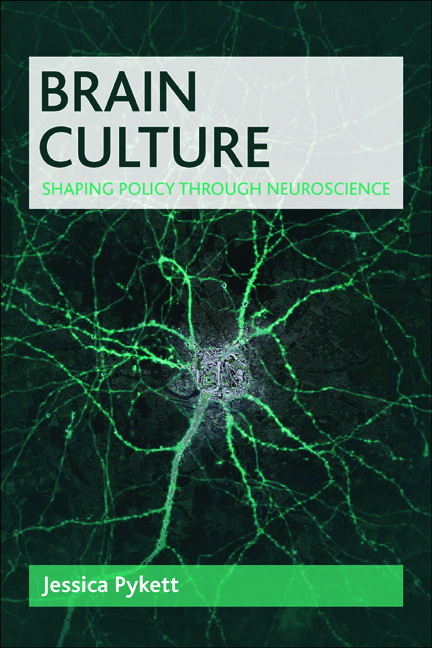Book contents
- Frontmatter
- Dedication
- Contents
- About the author
- Acknowledgements
- Preface
- One Introduction: governing through brain culture
- two Brain culture in context
- three Designing cerebral cities
- four Teaching the learning brain
- five Managing workplace emotions
- six Conclusion: what is at stake in the brain world?
- References
- Index
One - Introduction: governing through brain culture
Published online by Cambridge University Press: 10 March 2022
- Frontmatter
- Dedication
- Contents
- About the author
- Acknowledgements
- Preface
- One Introduction: governing through brain culture
- two Brain culture in context
- three Designing cerebral cities
- four Teaching the learning brain
- five Managing workplace emotions
- six Conclusion: what is at stake in the brain world?
- References
- Index
Summary
Are you for or against ‘brain culture’? Today there is extensive debate on the cultural, social and political implications of numerous insights from neuroscientific, behavioural and psychological research, from arguments over the consequences of brain-based teaching models in schools, the commercial adoption of neuroscientific methods and technologies, to the ethics of using behavioural insights to inform public policy. There are concerns around about the scientific venture of neuroscience itself, as it seemingly transforms our understandings of the human condition, everyday behaviour and social relations. This debate has been voiced in popular literatures as well as in academic studies from a wide range of disciplines including anthropology, communications and media studies, gender studies, law, sociology, psychology, philosophy, politics, the biological and medical sciences and the emerging field of critical neuroscience. The aim of this book is to situate these theoretical and cultural critiques in a more specific analysis of contemporary public policies and social practices which have begun to absorb the influence of what has been dubbed ‘brain culture’ (M. Taylor, 2011; Thornton, 2011). The idea of brain culture refers to the way in which knowledge, images and representations of the brain shape our cultural identities and societies. This book examines what the influence of this broad phenomenon of brain culture means for re-shaping practices of governance and citizenship in the UK.
What evidence do we have of the contemporary emergence of brain culture? As we venture further into the 21st century, more than 20 years after US President George Bush welcomed in the 1990s as the ‘decade of the brain’, the UK has been recognised as a social laboratory for innovations in public policy and practice which look to the behavioural and neurosciences for their rationale. In 2007, a major UK educational research initiative reported on the findings of recent decades of investigation relevant to shaping the future of neuroscience in education (Howard-Jones, 2007). The UK has also incubated a growing network of expertise in mindfulness-based cognitive therapies (MBCT) that are put to use in both mental health and workplace settings in order to relieve stress and to cultivate new brain habits.
- Type
- Chapter
- Information
- Brain CultureShaping Policy through Neuroscience, pp. 1 - 36Publisher: Bristol University PressPrint publication year: 2015



